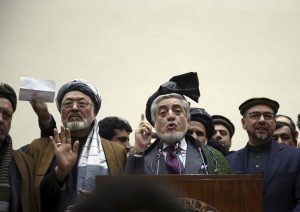On Tuesday, Afghanistan’s Independent Election Commission (IEC) announced incumbent President Ashraf Ghani as the winner of last September’s election. Ghani narrowly avoided a second round by capturing 50.64 percent of the vote. His victory came after nearly five months of recounting and squabbling, and the disagreements are far from settled.
Chief Executive Officer Abdullah Abdullah — who, the IEC says, captured 39.52 percent of the vote, finishing second — immediately protested the result. Abdullah declared victory and announced the formation of an “inclusive government.”
Abdullah was joined in protesting the results by the distant third-place finisher, with 3.85 percent of the vote according to the IEC, Gulbuddin Hekmatyar. Hekmatyar reportedly challenged Ghani to a head-to-head contest in any province. “If you [Ghani] get 30 percent of the votes, I will accept you as president,” he reportedly said. Hekmatyar, TOLOnews reports, said at a press conference Wednesday in Kabul that he did not support a “parallel government,” but “an inclusive government where all see themselves represented, including the Taliban.”
In 2016, Hekmatyar — who leads Hezb-i-Islami — settled a peace deal with the Afghan government, received a pardon and was allowed into the political arena.
General Abdul Rashid Dostum, who has served as Ghani’s vice president since 2014, also rejected the IEC’s results. Dostum, a prominent ethnic Uzbek warlord, told a gathering of his supporters that “the people’s vote has been ignored and the team that lost the election has been announced as the winner of the election.”
“From the bottom of our heart, we are supporting the announcement of the inclusive government of Abdullah Abdullah,” Dostum said, asking his supporters to “not be silent.”
Former President Hamid Karzai essentially said “I told you so.”
In a statement, Ghani’s predecessor said, “The process that was imposed on our people under the name of ‘elections’ was not a national process and was in contrast to the values of democracy.”
The statement went on to say: “Given the overall situation in the country, particularly what has happened over the past five months, especially after the announcement of the results, it is natural that the results declared are not accepted.”
After 2014’s hotly contested election, which was also beset by accusations of fraud, the top two contenders — Ghani and Abdullah — were nudged into a National Unity Government (NUG) arrangement by then-U.S. Secretary of State John Kerry. The arrangement arguably institutionalized their infighting rather than settling their feud.
As it stands now, the election results — even as announced — are too close for comfort. Ghani only barely avoided a second round and Abdullah doesn’t look keen on stepping aside. On Wednesday, Abdullah issued a decree barring members of the IEC from leaving Afghanistan; a spokesman from the Interior Ministry pushed back, noting, “According to the law, only the Attorney General’s Office and Supreme Court have the authority to ban the people [from traveling].”
The timing of this fiasco could not be worse. According to various reports, the United States and the Taliban are tantalizingly close to announcing a short ceasefire — a “reduction in violence” — intended to be followed by intra-Afghan talks. With Kabul in disarray, who will sit across from the Taliban at the potential negotiation table?
Ghani urged unity Wednesday: “We have come to unite our country, we will work for unity.”

































